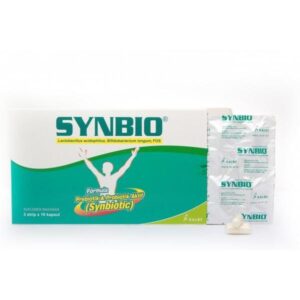LACTOBACILLUS ACIDOPHILUS + GLUTAMINE + BIFIDOBACTERIUM WITH FOS
Lactobacillus Acidophilus: Lactobacillus acidophilus is a probiotic, which means it contains live bacteria that are beneficial to the body. It is commonly found in yogurt and other fermented foods, as well as in dietary supplements.
Use:
Lactobacillus acidophilus is primarily used to promote a healthy balance of gut bacteria. It is often taken to manage various gastrointestinal issues such as diarrhea, bloating, gas, and constipation. Some people also take it to boost their immune system or prevent urinary tract infections.
Mechanism of Action:
Lactobacillus acidophilus works by replenishing the natural bacteria in the gut and promoting a healthy gut environment. It helps maintain a balance between “good” and “bad” bacteria, which in turn supports proper digestion, nutrient absorption, and immune function.
Dose:
The appropriate dose of Lactobacillus acidophilus can vary depending on the specific product and individual needs. It is commonly available as capsules or in powder or liquid form. It is essential to follow the instructions on the packaging or consult a healthcare professional for personalized dosing recommendations.
Side Effects:
Lactobacillus acidophilus is generally considered safe for most individuals, and side effects are rare. However, some people may experience mild gastrointestinal symptoms such as gas, bloating, or an upset stomach when initially starting the supplement. These effects are typically temporary and tend to resolve on their own.
In rare cases, individuals with weakened immune systems or those with serious underlying conditions may develop infections from certain strains of Lactobacillus acidophilus. It is important to consult a healthcare professional before starting any new supplement, especially if you have any pre-existing medical conditions.
Overall, Lactobacillus acidophilus is a widely used and well-tolerated probiotic that can provide various health benefits. However, it is always advisable to seek medical advice to ensure it is the right option for your specific needs.
Glutamine: Glutamine is a non-essential amino acid that plays a crucial role in various physiological functions in the body. It is used as a medication and dietary supplement for various indications.
Glutamine is commonly used in the treatment of digestive system disorders, such as inflammatory bowel disease (IBD), including Crohn’s disease and ulcerative colitis. It can help to reduce symptoms such as diarrhea, abdominal pain, and inflammation in the gut. Glutamine is also used to support the immune system and promote wound healing, making it valuable in critically ill patients and those undergoing surgery or chemotherapy.
The mechanism of action of glutamine lies in its ability to provide energy and support cellular functions. It serves as a fuel source for cells lining the intestines, promoting their repair and maintenance. Glutamine also helps to optimize immune function and regulate inflammation in the body.
The dosage of glutamine varies depending on the specific condition being treated. For digestive disorders, the typical adult dose is around 0.2-0.3 grams per kilogram of body weight, taken two to three times a day. It is usually administered via oral supplementation in the form of powder or capsules.
While glutamine is generally safe for most individuals, it can have some side effects. These include nausea, vomiting, abdominal pain, and diarrhea. Some individuals may also experience allergic reactions such as rash or difficulty breathing. In rare cases, high doses of glutamine may cause liver damage. It is important to consult with a healthcare professional before starting glutamine supplementation, especially if you have any pre-existing medical conditions or are taking other medications.
Overall, glutamine is a valuable amino acid that can be used as a therapeutic agent in various conditions. However, it is essential to follow the recommended dosage and consult with a healthcare professional to ensure its safe and effective use.
Bifidobacterium With Fos: Drug: Bifidobacterium with FOS
Use: Bifidobacterium with FOS is a probiotic supplement primarily used to support and maintain a healthy gut microbiota. It is commonly used to improve digestion, boost the immune system, and prevent gastrointestinal issues such as diarrhea, constipation, and bloating. It may also aid in the treatment of certain conditions like irritable bowel syndrome (IBS) and lactose intolerance.
Mechanism of Action: Bifidobacterium with FOS contains a strain of beneficial bacteria called Bifidobacterium, along with fructooligosaccharides (FOS). Bifidobacterium is a naturally occurring bacterium in the gut that helps maintain a healthy balance of microorganisms in the digestive system. FOS serves as a prebiotic, providing nourishment for the Bifidobacterium and promoting its growth and activity. Together, Bifidobacterium and FOS help restore and enhance the natural gut flora, contributing to improved digestion and overall gut health.
Dose: The recommended dose of Bifidobacterium with FOS may vary depending on the specific product and formulation. It is generally available in the form of capsules or powder. The typical dosage is 1 to 2 capsules or 1 to 2 teaspoons of powder daily, preferably with a meal or as directed by a healthcare professional. It is essential to follow the instructions provided by the manufacturer or healthcare provider for optimal results.
Side effects: Bifidobacterium with FOS is considered safe for most individuals when taken as directed. However, some people may experience mild side effects such as bloating, gas, or an upset stomach. These side effects are usually temporary and subside with continued use. In rare cases, individuals with compromised immune systems or medical conditions may experience more severe side effects, necessitating immediate medical attention. It is advisable to consult a healthcare professional before starting any new supplement, especially for individuals with underlying health conditions or taking other medications that may interact with Bifidobacterium with FOS.

